The Customer Journey Mapping Software Market is estimated to be valued at USD 16.8 billion in 2025 and is projected to reach USD 76.2 billion by 2035, registering a compound annual growth rate (CAGR) of 16.3% over the forecast period.
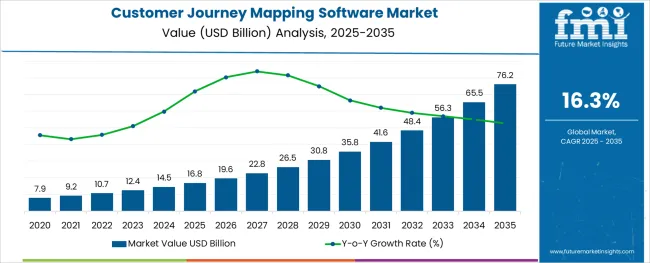
The customer journey mapping software market is witnessing steady expansion, propelled by increasing demand from enterprises aiming to enhance customer experience, optimize touchpoints, and gain actionable insights from multi-channel customer interactions. The growing importance of customer-centric strategies, especially in the wake of intensified digital transformation initiatives, has positioned journey mapping tools as a critical component in operational workflows.
Companies are actively adopting these platforms to visualize, analyze, and improve customer journeys, driving operational efficiencies and fostering stronger customer engagement. Over the forecast period, sustained growth is anticipated as organizations place heightened emphasis on personalized experiences, retention strategies, and omnichannel consistency.
The proliferation of data-driven decision-making and the integration of artificial intelligence and advanced analytics within these platforms are expected to further augment their relevance. Additionally, rising competition across sectors such as BFSI, retail, and healthcare is compelling businesses to invest in sophisticated customer journey analytics to maintain competitive positioning. These combined factors are poised to ensure continuous growth in market adoption, with enhanced product capabilities and cloud-based deployment models strengthening accessibility across various enterprise scales.
The market is segmented by Offering, Organization Size, End-User, and Platform and region. By Offering, the market is divided into Solutions and Services. In terms of Organization Size, the market is classified into Small and Medium Enterprises and Large Enterprises. Based on End-User, the market is segmented into BFSI, Retail and Consumer Goods, Media and Entertainment, Healthcare and Pharmaceutical, Automotive, IT and Telecommunication, Travel and Hospitality, Education, and Others. By Platform, the market is divided into Web-based and App-based. Regionally, the market is classified into North America, Latin America, Western Europe, Eastern Europe, Balkan & Baltic Countries, Russia & Belarus, Central Asia, East Asia, South Asia & Pacific, and the Middle East & Africa.
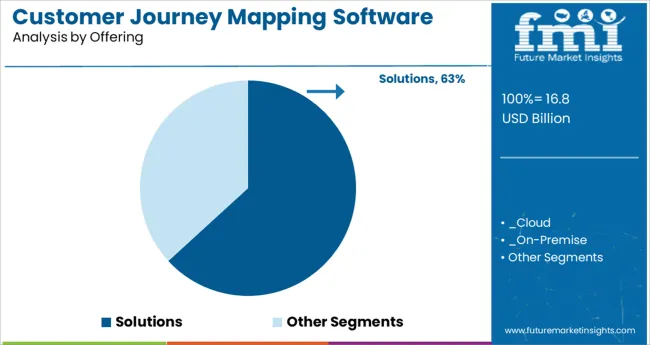
The solutions segment commanded a dominant 63.2% share of the customer journey mapping software market, reflecting its indispensable role in enabling businesses to effectively capture, visualize, and analyze customer experiences across diverse channels. The segment’s leadership position has been maintained by robust enterprise demand for intuitive, scalable, and feature-rich platforms that assist in identifying service gaps and optimizing engagement strategies.
Organizations are increasingly deploying these solutions to support real-time journey tracking, sentiment analysis, and predictive modeling, aligning their operations with evolving consumer expectations. The accelerated shift towards digital service delivery has further underscored the relevance of journey mapping solutions in facilitating seamless, personalized experiences.
Additionally, the availability of customizable dashboards, advanced analytics modules, and AI-powered automation features has strengthened the value proposition for these platforms, fostering broader adoption across both large enterprises and SMEs. Anticipated advancements in customer data integration and cloud-native architectures are expected to sustain this segment’s strong growth momentum in the foreseeable future.
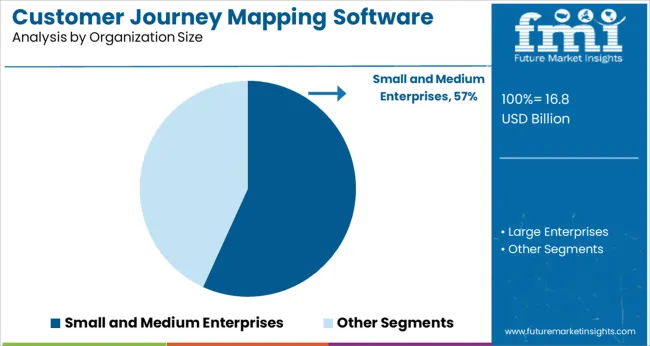
Small and medium enterprises (SMEs) held a notable 56.8% share within the customer journey mapping software market’s organization size category, driven by the rising recognition of customer experience as a competitive differentiator among smaller businesses. This segment’s robust performance is attributed to growing accessibility of affordable, cloud-based platforms tailored to meet the operational and financial constraints of SMEs.
The democratization of digital tools and the increasing emphasis on customer retention and loyalty programs have encouraged smaller organizations to adopt these solutions. Additionally, SMEs are leveraging journey mapping software to optimize limited resources by prioritizing high-impact customer touchpoints and refining service delivery models.
The flexibility, scalability, and user-friendly interfaces offered by modern solutions have further accelerated adoption among this segment. As SMEs continue to scale digital operations and engage with customers across multiple online and offline channels, the demand for efficient, cost-effective journey mapping software is projected to maintain an upward trajectory, contributing to sustained market expansion.
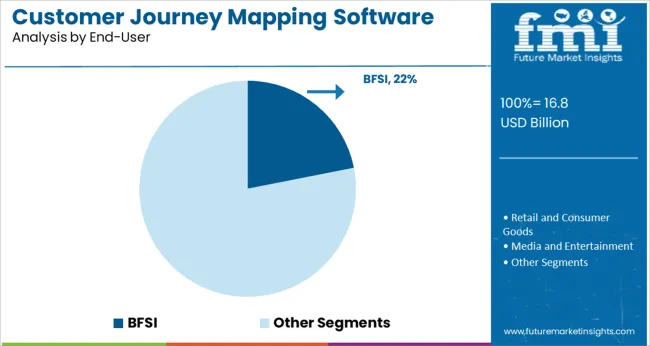
The BFSI segment accounted for a substantial 21.9% share within the customer journey mapping software market’s end-user category, highlighting its strategic reliance on customer journey insights to drive customer satisfaction, loyalty, and operational efficiency. Financial institutions, insurance providers, and fintech companies are increasingly adopting these tools to monitor and enhance customer experiences across complex, multi-channel ecosystems.
The sector’s high customer churn risk and regulatory requirements for transparent, compliant service delivery have further fueled demand for comprehensive journey mapping solutions. Additionally, BFSI enterprises are leveraging these platforms to support personalized product recommendations, streamline customer onboarding, and reduce friction in service interactions.
The integration of journey mapping with advanced analytics, AI, and CRM systems has enhanced the ability of financial service providers to proactively address customer needs and preferences. As digital banking and virtual financial services continue to expand, the BFSI sector’s investment in sophisticated customer journey management tools is expected to remain strong, contributing significantly to overall market growth.
Increasing adoption of Journey Mapping Software will boost the market growth
The global customer journey-mapping software market is primarily driven by the increasing adoption of journey-mapping software by all types of enterprises. There is augmenting demand for lead conversion amongst enterprises point of interaction between customers and business needs to be increased.
By using customer journey mapping software, the rate of conversion, as well as the profit, will develop, thus leading conversion amongst enterprises will foster the growth of the industry. The customer journey mapping software is one such program, which aligns the organization’s goals and objectives with its customer. This is also anticipated to boost the market growth over the analysis period.
Further, businesses are more reliant on extending their tools and platforms on the cloud, and the adoption of cloud-based platforms has been developed over the past years, owing to factors such as ease of deployment, cost-effectiveness, flexibility, and increased productivity.
The market players are offering dedicated cloud-based customer journey mapping software. This will significantly intensify the growth of the Customer Journey Mapping Software Market during the forecast period.
The advancement in digital technology has led businesses to rethink their business model around their customers, the rate of adoption of smart devices has increased over the years and the customer experience model is also changing. Companies are adopting digital technologies to stay ahead of their competitors. Digital transformation will force companies to find solutions that will transform their business instead of the old ways of working.
Customer journey mapping provides companies with efficient mapping techniques by analyzing customer journeys, which is expected to provide new opportunities for customer journey mapping software provider companies. Thus, digital transformation will accelerate the growth of the customer journey mapping software market in the forthcoming years.
For instance, CRMs are considered one form of customer journey mapping tool because they help companies keep track of their customers through various touchpoints including email interaction history and contact center conversations among others.
Difficulty in quantifying Customer Experience ROI
All organizations want to measure and manage their efforts with numbers. Quantifying the ROI of customer experience is the toughest challenge for CX leaders, but it is most important for brands to justify financial results. Organizations across industries struggle to connect customer behavior and journeys to business-critical KPIs, such as revenue, churn, and cost to serve.
The organization faces an inability to measure the impact of CX on business outcomes, which makes it difficult to secure a CX budget. Organizations that are challenged to quantify the ROI of CX initiatives report stagnant budgets or small decreases. Without resources, CX leaders cannot invest in the technology necessary to effectively measure and improve customer experience. Investing in CX brings a strong return on investment.
The key is using data to prove the ROI of CX. Investing in customer experience builds a powerful lifeline between customers and the company. A large amount of structured and unstructured databases require significant resources, such as money, time, and employees, to analyze. This creates issues that block the optimum ROI from customer journey analytics.
Data Security and Privacy Concerns
Security threats are projected to grow even further in the future. In the past four years, the financial impact of cybercrimes has increased by nearly 78%, and the time it takes to resolve cyberattacks has doubled. There are privacy concerns that are faced by many businesses.
The data stored on the cloud is at risk, which in turn is expected to restrain the growth of the global Customer Journey Mapping Software Market. Data breaches are frequent theft faced by various organizations. These threats are hijacking, insider threats, malware injection, and insecure APIs.
How Does the Focus on Virtual Touchpoints Propel Market Growth?
The emergence of technologies such as artificial intelligence (AI) is expected to create enormous revenue growth opportunities for the customer journey mapping market to provide a convenient, intelligent, and informed customer experience at any point along the customer journey. This will lead to re-structure customer experiences and end-to-end customer journey patterns that are unified around personal information.
In addition, with the proliferation of machine learning capabilities in behavioral analytics, the new generation of data unification tools will make the daunting task of data synchronization cost-efficient, fast, and relatively pain-free. In-the-moment engagement models will lead the customer journey analytics SaaS platforms to deliver comprehensive real-time touchpoint integration with minimal investment.
Cross-channel journey analytics with the launch of advanced applications such as chatbots, virtual assistants, and others, is further expected to boost the growth of the market in the near future.
Rise in demand for Real-Time Customer Journey Mapping for generating Actionable Insights
In today’s digital and big data era, data can be structured or unstructured, and most of it resides outside enterprises. Thus, it has become crucial to have a platform that can be used to integrate various customer information.
Currently, enterprises need a comprehensive customer journey analytics platform that can collect a high volume of customer data in real-time to provide meaningful insights. This can assimilate data, structure, refine, provide the exploratory capability, identify and evaluate various patterns, and help make insight-based decisions faster.
Customer journey mapping offers layers that enable users to explore data in understanding customer needs and project trends and draw valuable insights using known analysis methods, such as sales and marketing optimization, cost optimization, risk management, and social network analysis.
The latest data and analytics tools are projected to provide growth opportunities to analyze data for the benefit of customers and the market. They help in making changes in internal processes and developing the product and service model.
Large Enterprises segment to witness considerable CAGR for the market growth
The large enterprise's segment of the customer journey mapping software market accounts for the highest CAGR of 15.8% during the forecast period, attributed to the increasing demand, particularly from this segment.
Customer experience journey mapping software helps large enterprises understand a customer’s full experience using effective visualizations. It also helps to improve and intensify the full customer experience by generating a visualization of every customer touchpoint.
The solutions segment is likely to be the highest CAGR holder for the market growth
The solutions segment of the customer journey mapping software market is expected to grow at the highest CAGR of 16.0% during the forecast period. Under the solutions segment, cloud-based deployment of customer journey mapping software will dominate the market over the forecast period, as the cloud technology provides better flexibility, a high degree of security, and a level of control and it is also a cost-effective solution.
Cloud deployment helps businesses to accomplish cross-channel communication with their customers, enabling them to send information via emails, text messages, push alerts, in-app, and web notifications, as well as on-site warnings. It can also be used to share online and offline reviews as well as feedback reports with customers.
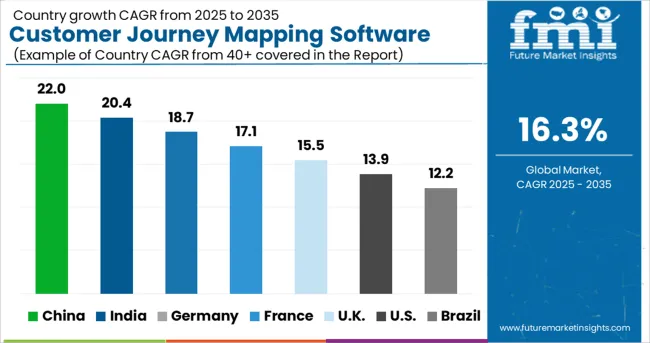
Adoption of new technology to Widen the Scope of the market in North America
North America is expected to dominate the customer journey mapping software market, owing to the immediate adoption of new and emerging technologies and the presence of significant market players in the region.
The USA is expected to hold a significant position in the global customer journey mapping software market, experiencing a CAGR of 16.1% during the forecast period.
Customer Journey Mapping Software Market in China to Witness Better Growth Opportunities
The Asia Pacific region is expected to grow at the highest CAGR during the forecast period, owing to the growing adoption of customer journey mapping software. The growing awareness for enhancing customer experience in key countries, such as China, India, and Japan, is expected to fuel the adoption of customer journey analytics solutions and services.
In addition, the commercialization of AI and ML technology, giving rise to increased customer data, and the need for further advancements to leverage its benefits to the maximum are expected to drive the adoption of the customer journey mapping software market in the region. China is expected to represent the highest CAGR of 15.7% in the customer journey mapping software market during the forecast period.
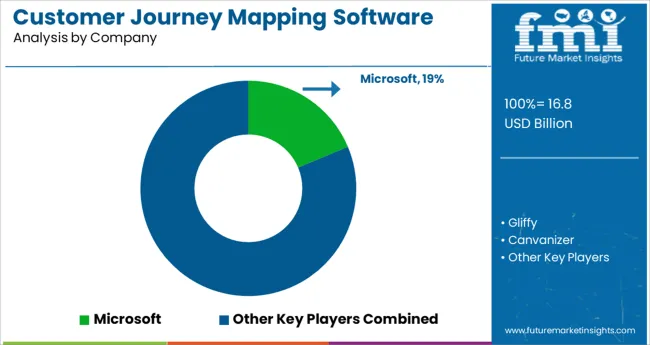
Microsoft, Gliffy, Canvanizer, Xmind, OmniGraffle, Smaply, Touchpoint, IBM, Smartlook, UXPressia, Piwik PRO, and Custellence, among others are the top companies in the global customer journey mapping software market.
With a sizable customer journey mapping software market share, these main firms are concentrating on growing their consumer base into new countries. These businesses are making use of strategic collaboration initiatives to grow their market share and profits.
Mid-size and smaller businesses, on the other hand, are expanding their market presence by gaining new contracts and entering new markets, thanks to technical developments and product innovations.
Recent Developments
The global customer journey mapping software market is estimated to be valued at USD 16.8 billion in 2025.
It is projected to reach USD 76.2 billion by 2035.
The market is expected to grow at a 16.3% CAGR between 2025 and 2035.
The key product types are solutions, _cloud, _on-premise and services.
small and medium enterprises segment is expected to dominate with a 56.8% industry share in 2025.






Full Research Suite comprises of:
Market outlook & trends analysis
Interviews & case studies
Strategic recommendations
Vendor profiles & capabilities analysis
5-year forecasts
8 regions and 60+ country-level data splits
Market segment data splits
12 months of continuous data updates
DELIVERED AS:
PDF EXCEL ONLINE
Customer Communications Management Market Size and Share Forecast Outlook 2025 to 2035
Customer Experience Management (CEM) In Telecommunication Market Size and Share Forecast Outlook 2025 to 2035
Customer Engagement Hub (CEH) Market Size and Share Forecast Outlook 2025 to 2035
Customer-Facing Technology Market Size and Share Forecast Outlook 2025 to 2035
Customer Experience Platforms Market by Interaction Points, Deployment, Enterprise Size, Region-Forecast through 2035
Customer Analytics in E-commerce Market by Component by Application & Region Forecast till 2035
Customer Engagement Solutions Market Analysis - Demand & Growth through 2034
Customer Service Software Market Size and Share Forecast Outlook 2025 to 2035
Customer Advocacy Software Market - Enhancing Brand Loyalty
Customer Revenue Optimization (CRO) Software Market Size and Share Forecast Outlook 2025 to 2035
Customer-To-Customer (C2C) Community Marketing Software Market Size and Share Forecast Outlook 2025 to 2035
Customer Journey Analytics Software Market Size and Share Forecast Outlook 2025 to 2035
Virtual Customer Premises Equipment Market Size and Share Forecast Outlook 2025 to 2035
Collaborative Customer Interfaces Market Analysis and Forecast 2025 to 2035, By Deployment Type, Type of User, End Use, and Region
Spending In Digital Customer Experience and Engagement Solutions Market Size and Share Forecast Outlook 2025 to 2035
Life Sciences Next-generation Customer Engagement Platforms Market Size and Share Forecast Outlook 2025 to 2035
Software-Defined Wide Area Network Market Size and Share Forecast Outlook 2025 to 2035
Software Defined Vehicle Market Size and Share Forecast Outlook 2025 to 2035
Software Defined Networking (SDN) And Network Function Virtualization (NFV) Market Size and Share Forecast Outlook 2025 to 2035
Software Defined Perimeter (SDP) Market Size and Share Forecast Outlook 2025 to 2035

Thank you!
You will receive an email from our Business Development Manager. Please be sure to check your SPAM/JUNK folder too.
Chat With
MaRIA